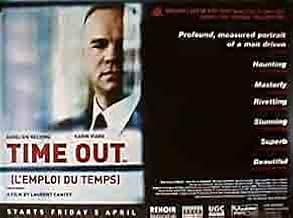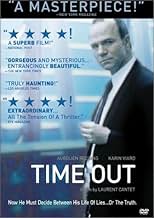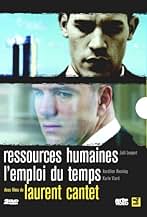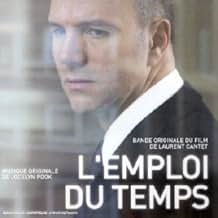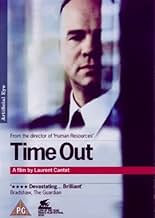IMDb रेटिंग
7.3/10
5.2 हज़ार
आपकी रेटिंग
अपनी भाषा में प्लॉट जोड़ेंAn unemployed man finds his life sinking more and more into trouble as he hides his situation from his family and friends.An unemployed man finds his life sinking more and more into trouble as he hides his situation from his family and friends.An unemployed man finds his life sinking more and more into trouble as he hides his situation from his family and friends.
- निर्देशक
- लेखक
- स्टार
- पुरस्कार
- 3 जीत और कुल 8 नामांकन
Didier Reyes
- Philippe
- (as Didier Perez)
फ़ीचर्ड समीक्षाएं
Playing authority figures in dark suits, the actor Stellan Skarsgard always suggests a noble melancholy, a weatherbeaten soul underneath his Swedish-oil-exec good looks. William H. Macy has made a career out of essaying the disappointments of pride-in-professionalism white men. Aurelien Recoing, the hero of Laurent Cantet's L'EMPLOI DU TEMPS, doesn't summon the instant empathy we feel for those actors. Cantet is a schematist in the style of Arthur Miller: without Miller's cornballs, but also without his visceral punch. Recoing's very body seems to be a manifestation of Cantet's two-sided patness. From the front, Recoing has some of the bland, boyish-haired handsomeness of a Skarsgard or a young Klaus Maria Brandauer. From the back, balding and bearlike-hulking, Recoing is a monster or a wreck. Cantet's movies--old-school, slowly downhill-rolling tragedies about the inhumanity of late capitalism--use Jekyll-and-Hyde dichotomies for thudding dramatic effects.
Recoing's Vincent has lost his job as a management consultant. Instead of getting another one, he drives around, hangs out in office-building lobbies and hotel bars, and generally dresses and comports like an upper-middle-class Frenchman. When he starts dreaming up a fantasy job--bringing bucks to developing markets in the Third World via the U.N.--he starts taking money from all-too-eager friends to invest. Then a middle-class mobster is onto Vincent's scheme. And from there...before you can say FARGO, the cards come tumblin' down.
Like Cantet's last movie, HUMAN RESOURCES, we are meant to hate the game, not the player, and to believe that a rigged, soulless system has robbed Cantet's characters of their capacity to experience joy on earth. But what does this character want, exactly? At one moment, he seems to genuinely wish he had the idealistic U.N. job--something, at his stage of life, with his background in the for-profit world, he could never attain. At other moments he seems to want to drive around the snowy countryside and listen to golden oldies. At still others, he seems to enjoy, a la Kevin Spacey in AMERICAN BEAUTY, the undemanding work of selling hot stereos and toasters for his mafia friend. And yet Cantet has designed the movie to make it seem as if the need for status, for patriarchal prestige, has led Vincent into the fantasy land that is his undoing. The ending--a softer landing than you might be expecting--is meant to be soul-chilling.
But what's the big whip? Everyone has dreamed of a life of aimless rambling; those who have it never seem very happy with it. (Cantet could've tested his ideas if he had bought Vincent a ticket to a lazybones' paradise.) And Cantet underlines the irony that Vincent's hustling to keep himself in non-work is in itself a more than full-time job. Cantet's movies struggle for a Miller-like inevitability, but they always fail to persuade on a human level; his crushed heroes seem more constructs than creatures. One brilliantly observant (and shudder-inducingly cruel) moment: Vincent's wife catches on to his ruse when he brings a buddy from the office to dinner--a pockmarked hustler who is too low-class to inhabit the highflown world Vincent pretends to have a berth in. The jig is up for Vincent because his wife's snob meter goes off. Too bad nothing else is as acutely examined or observant.
Recoing's Vincent has lost his job as a management consultant. Instead of getting another one, he drives around, hangs out in office-building lobbies and hotel bars, and generally dresses and comports like an upper-middle-class Frenchman. When he starts dreaming up a fantasy job--bringing bucks to developing markets in the Third World via the U.N.--he starts taking money from all-too-eager friends to invest. Then a middle-class mobster is onto Vincent's scheme. And from there...before you can say FARGO, the cards come tumblin' down.
Like Cantet's last movie, HUMAN RESOURCES, we are meant to hate the game, not the player, and to believe that a rigged, soulless system has robbed Cantet's characters of their capacity to experience joy on earth. But what does this character want, exactly? At one moment, he seems to genuinely wish he had the idealistic U.N. job--something, at his stage of life, with his background in the for-profit world, he could never attain. At other moments he seems to want to drive around the snowy countryside and listen to golden oldies. At still others, he seems to enjoy, a la Kevin Spacey in AMERICAN BEAUTY, the undemanding work of selling hot stereos and toasters for his mafia friend. And yet Cantet has designed the movie to make it seem as if the need for status, for patriarchal prestige, has led Vincent into the fantasy land that is his undoing. The ending--a softer landing than you might be expecting--is meant to be soul-chilling.
But what's the big whip? Everyone has dreamed of a life of aimless rambling; those who have it never seem very happy with it. (Cantet could've tested his ideas if he had bought Vincent a ticket to a lazybones' paradise.) And Cantet underlines the irony that Vincent's hustling to keep himself in non-work is in itself a more than full-time job. Cantet's movies struggle for a Miller-like inevitability, but they always fail to persuade on a human level; his crushed heroes seem more constructs than creatures. One brilliantly observant (and shudder-inducingly cruel) moment: Vincent's wife catches on to his ruse when he brings a buddy from the office to dinner--a pockmarked hustler who is too low-class to inhabit the highflown world Vincent pretends to have a berth in. The jig is up for Vincent because his wife's snob meter goes off. Too bad nothing else is as acutely examined or observant.
People may lie for the thrill of being appreciated, or out of the fear of not being so; but while a fantasy world may initially seem liberating, it can become a prison as well. These themes are explored in 'Time Out', the story of Vincent, a man who loses his job and pretends he hasn't, rather than face up to the truth. There's a nice absence of didacticism in the way this film is assembled, a rich picture is assembled but without any attempt to ram a single interpretation down the audience's throat; it adds up to a fine portrait of depression, and a loneliness that oddly can exist only within a relationship. But there's also a creativeness in Vincent's behaviour which is necessary to generate the plot but which doesn't quite square with the rest of the movie: the film is more convincing once Vincent is deeply trapped in the web of his own lies, rather than when he is spinning it. At the heart of 'Time Out', Vincent remains an enigma unclarified: it is this that is both the film's strength and weakness. It's not a perfect film, and the start is quite dull, but the longer it lasts, the deeper it feels.
10cestmoi
Has anybody ever set up a truck stop shot more magnificently?
This film is the full ten thing. Cast is spectacular, the photography superb, the unobtrusive music on the money, the story and its effects on the life of a family, affecting. Subtlety is a hallmark here. If you don't know the story line it must be even more powerful in a first viewing. As Fellini made at least two films that can be seen as defining the male of the Catholic/Italian species (8 1/2 & Amarcord) this magnificent film from France from a director I am not familiar with, defines "the problem of being male." I was fully involved and unable to complete a sentence for twenty minutes after the lights went up. But it is just not male identification at work here. It is the anguish and plight of the wife, magnificently played by Karen Viard, or the children who are as confused and anxious as any of us. The father, a very French man with a franc or euro, even redeems himself with love and compassion. And the "unsavory" seller of bogus goods who rescues our Vincent by offering employment, comes through swimmingly with compassion and understanding. I can not recommend this film enough. Please see it.
This film is the full ten thing. Cast is spectacular, the photography superb, the unobtrusive music on the money, the story and its effects on the life of a family, affecting. Subtlety is a hallmark here. If you don't know the story line it must be even more powerful in a first viewing. As Fellini made at least two films that can be seen as defining the male of the Catholic/Italian species (8 1/2 & Amarcord) this magnificent film from France from a director I am not familiar with, defines "the problem of being male." I was fully involved and unable to complete a sentence for twenty minutes after the lights went up. But it is just not male identification at work here. It is the anguish and plight of the wife, magnificently played by Karen Viard, or the children who are as confused and anxious as any of us. The father, a very French man with a franc or euro, even redeems himself with love and compassion. And the "unsavory" seller of bogus goods who rescues our Vincent by offering employment, comes through swimmingly with compassion and understanding. I can not recommend this film enough. Please see it.
TIME OUT (Laurent Cantet - France 2001).
The English language title Time Out is not entirely fitting. Perhaps Time Running Out would be a more appropriate title, since this is exactly what Vincent, the main character, is going through.
Vincent (Aurélien Recoing) is a highly motivated financial consultant. Or, at least, that's what he used to be. Fact of the matter is, he lost his job three months ago and now concocts an elaborate facade to cover up the fact he is now unemployed. While his wife, Muriel (Karin Viard), thinks he's at work, Vincent is aimlessly roaming the highways, hanging out at rest stops, and sleeping in his car, regularly calling his wife to give her an update about his next meeting and apologizing for coming home late, before turning in for his overnight stay in his car. Vincent lives like a ghost, increasingly detached from his wife, children and former colleagues, he doesn't seem to realize the truth is closing in. One day, they will find out. But Vincent has gotten to a point where he's constructed his own dream world. He resorts to reading all kinds of economic pamphlets about his apparent line of business, studying and memorizing them like he really is active in this line of work. As Vincent needs money, he makes up a plan to defraud old friends and his parents out of their savings by letting them in on some bogus investment scheme. He conducts his business out of a hotel lounge, where he catches the eye of Jean-Michel (Serge Livrozet, a brilliant role), a "real" , experienced operator who immediately recognizes Vincent is a fraud. He offers Vincent a job in his own operation, meaning some extra pocket money and perhaps even a way out of his increasingly sticky situation.
Director Cantet's style is distinctly unflashy. Set against the wintry landscapes of Rhône-Alpes around Grenoble and Annecy, the film makes very good use of its locations. Whether it's the bland office complexes in the "zones commerciales" at the outskirts of anonymous towns, or the snow-clad mountains surrounding them, it seems to blend perfectly with the film's tone. Accompanied by a beautiful classical score, Cantet shows himself a remarkably sharp and observant storyteller. Although the film maintains interest throughout, the running time of 132 minutes did seem a tad long, and Vincent's lengthy economic arguments when conning his friends and relatives (some of them business men themselves) out of their money weren't terribly convincing. His arguments range from unconvincing to downright nonsense. At least he would'n have convinced me, but even my 91 year old grandmother wouldn't have bought any of this for a moment. But, some of these inconsistencies aside, this is a skilfully constructed film and an engrossing psychological drama that slowly unfolds like a thriller with a brilliant performance by Aurélien Recoing to top it off.
Camera Obscura --- 8/10
The English language title Time Out is not entirely fitting. Perhaps Time Running Out would be a more appropriate title, since this is exactly what Vincent, the main character, is going through.
Vincent (Aurélien Recoing) is a highly motivated financial consultant. Or, at least, that's what he used to be. Fact of the matter is, he lost his job three months ago and now concocts an elaborate facade to cover up the fact he is now unemployed. While his wife, Muriel (Karin Viard), thinks he's at work, Vincent is aimlessly roaming the highways, hanging out at rest stops, and sleeping in his car, regularly calling his wife to give her an update about his next meeting and apologizing for coming home late, before turning in for his overnight stay in his car. Vincent lives like a ghost, increasingly detached from his wife, children and former colleagues, he doesn't seem to realize the truth is closing in. One day, they will find out. But Vincent has gotten to a point where he's constructed his own dream world. He resorts to reading all kinds of economic pamphlets about his apparent line of business, studying and memorizing them like he really is active in this line of work. As Vincent needs money, he makes up a plan to defraud old friends and his parents out of their savings by letting them in on some bogus investment scheme. He conducts his business out of a hotel lounge, where he catches the eye of Jean-Michel (Serge Livrozet, a brilliant role), a "real" , experienced operator who immediately recognizes Vincent is a fraud. He offers Vincent a job in his own operation, meaning some extra pocket money and perhaps even a way out of his increasingly sticky situation.
Director Cantet's style is distinctly unflashy. Set against the wintry landscapes of Rhône-Alpes around Grenoble and Annecy, the film makes very good use of its locations. Whether it's the bland office complexes in the "zones commerciales" at the outskirts of anonymous towns, or the snow-clad mountains surrounding them, it seems to blend perfectly with the film's tone. Accompanied by a beautiful classical score, Cantet shows himself a remarkably sharp and observant storyteller. Although the film maintains interest throughout, the running time of 132 minutes did seem a tad long, and Vincent's lengthy economic arguments when conning his friends and relatives (some of them business men themselves) out of their money weren't terribly convincing. His arguments range from unconvincing to downright nonsense. At least he would'n have convinced me, but even my 91 year old grandmother wouldn't have bought any of this for a moment. But, some of these inconsistencies aside, this is a skilfully constructed film and an engrossing psychological drama that slowly unfolds like a thriller with a brilliant performance by Aurélien Recoing to top it off.
Camera Obscura --- 8/10
Ironically, I just saw this a day after viewing Abbas Kiarostami's brilliant "Close Up", a story of a man who could no longer accept the endless banalities of his life and decided to become someone else (a film director!). That man had no sense of identity about himself but he knew what he cared about and what he believed in (the power of art and cinema). That brings him one up on the hero of this story. Vincent is a man who also cannot accept the banalities of his life, but he hasn't the foggiest idea of who he is or what he really cares about. It's as if he was born out of a computer software program. He knows what he's supposed to care about: nice home, nice car, nice bank account... But his work as an investor is so deprived of any human value that he loses all sense of values. His environment; a sterile, generic, upper middle-class vacuum that could make one believe that all of France has turned into Silicon Valley with a touch of the Scandinavian, has none of the passion or warmth that one identifies with being human. He has a loving wife, but according to his 'program', he believes that he would lose her if she knew that he was no longer able to function as a cog in the machine, and provide her with the lifestyle that she has grown accustomed to.
That is the first tragedy of Vincent, because his wife really does love him. The second tragedy of Vincent, is that even though he recognizes his need for freedom, he doesn't know how to use it. He's like a man who has been released from a lifetime of imprisonment, but still hangs around the prison yard because he is unable to comprehend what might be available to him. He'd lost his job because his love for being free was more important to him than keeping his appointments, but most of his time spent in his new-found freedom is in doing the same job he'd done before: investments. The only difference now is that he likes to believe that the investments are helping developing Third World countries. He knows that there really are no investments (he keeps the money that people give him and spends it on a nifty Range Rover, among other things), but momentarily, he can feel as if he is 'somebody' to his family and friends when he tells them of this meaningful new job he (allegedly) has.
Vincent has been described by many as 'everyman', but I think of him more as 'everyman who has just stepped through the looking glass'. Instead of taking a good, hard look at himself, he somehow ended up taking a look beyond himself because he could not find a reflection. He can't even recognize how much he's patterned his children to follow the same program he did. We see him teaching his kindergarten-age son how to 'hard sell' his toys at a school fair. Later, in a fascinating scene, we see him and his family doing what most people of his class do in their free time. They go shopping in an upscale, overpriced store to buy clothing that they know they don't really need. Vincent has it all, but it fills nothing in him. His family has it all, yet they don't seem to question the fact that they rarely spend any time together.
Laurent Candet has created a beautifully somber and sober look at the price of 'success'. The film is practically drained of all color, save for blues and grays, to illustrate the life force that has been systematically drained from Vincent throughout his life. And the score, a somber cello piece, refreshingly accentuates Vincent's mind instead of his actions (like most scores do). It is like a slow-moving merry-go-round that brings on a sense of familiarity that is simultaneously comfortable and unnerving. Because what the gist of it all is: is that no one wants to spend their life on a merry-go-round. Even a comfortable one.
That is the first tragedy of Vincent, because his wife really does love him. The second tragedy of Vincent, is that even though he recognizes his need for freedom, he doesn't know how to use it. He's like a man who has been released from a lifetime of imprisonment, but still hangs around the prison yard because he is unable to comprehend what might be available to him. He'd lost his job because his love for being free was more important to him than keeping his appointments, but most of his time spent in his new-found freedom is in doing the same job he'd done before: investments. The only difference now is that he likes to believe that the investments are helping developing Third World countries. He knows that there really are no investments (he keeps the money that people give him and spends it on a nifty Range Rover, among other things), but momentarily, he can feel as if he is 'somebody' to his family and friends when he tells them of this meaningful new job he (allegedly) has.
Vincent has been described by many as 'everyman', but I think of him more as 'everyman who has just stepped through the looking glass'. Instead of taking a good, hard look at himself, he somehow ended up taking a look beyond himself because he could not find a reflection. He can't even recognize how much he's patterned his children to follow the same program he did. We see him teaching his kindergarten-age son how to 'hard sell' his toys at a school fair. Later, in a fascinating scene, we see him and his family doing what most people of his class do in their free time. They go shopping in an upscale, overpriced store to buy clothing that they know they don't really need. Vincent has it all, but it fills nothing in him. His family has it all, yet they don't seem to question the fact that they rarely spend any time together.
Laurent Candet has created a beautifully somber and sober look at the price of 'success'. The film is practically drained of all color, save for blues and grays, to illustrate the life force that has been systematically drained from Vincent throughout his life. And the score, a somber cello piece, refreshingly accentuates Vincent's mind instead of his actions (like most scores do). It is like a slow-moving merry-go-round that brings on a sense of familiarity that is simultaneously comfortable and unnerving. Because what the gist of it all is: is that no one wants to spend their life on a merry-go-round. Even a comfortable one.
क्या आपको पता है
- ट्रिवियाInspired by a true story, that of Jean-Claude Romand. In reality, Romand went on to kill, on January 9, 1993, his wife, two children and both his parents. It is the first of three films in two years inspired by the case, followed by L'adversaire (2002) and Nobody's Life (2002), of which the former is the closest to the real events. Phantom (2002) was also inspired by the same incident.
- कनेक्शनFeatured in The 2003 IFP Independent Spirit Awards (2003)
- साउंडट्रैकL'Emploi Du Temps - Musique Originale
Composed by/ Arranged By Jocelyn Pook
Performed by 'Electra Strings' Ensemble
Cello Solo performed by Sophie Harris
Viola Solo performed by Clive Howard
Violin solo performed by Jacqueline Norrie
Phonographic Copyright (p) Jocelyn Pook / Haut et Court
Under Exclusive License To Virgin France
Published By Chester Music Ltd.
© 2001 Virgin France
टॉप पसंद
रेटिंग देने के लिए साइन-इन करें और वैयक्तिकृत सुझावों के लिए वॉचलिस्ट करें
- How long is Time Out?Alexa द्वारा संचालित
विवरण
बॉक्स ऑफ़िस
- US और कनाडा में सकल
- $4,48,542
- दुनिया भर में सकल
- $12,13,913
- चलने की अवधि
- 2 घं 14 मि(134 min)
- रंग
- ध्वनि मिश्रण
- पक्ष अनुपात
- 1.85 : 1
इस पेज में योगदान दें
किसी बदलाव का सुझाव दें या अनुपलब्ध कॉन्टेंट जोड़ें




